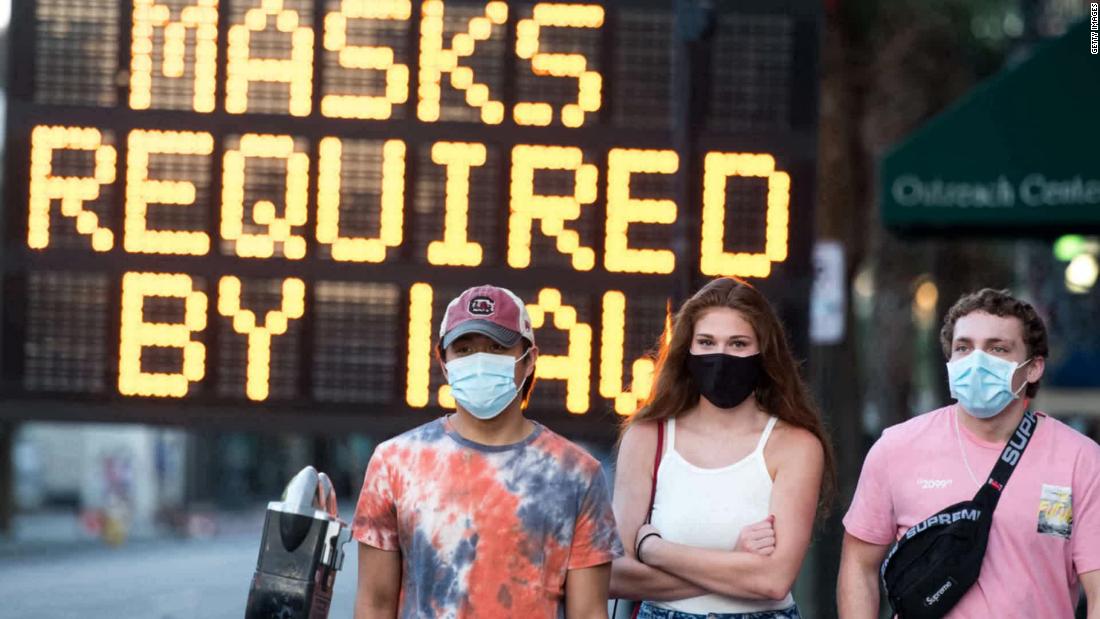
Among the measures referenced in the 30-second ad are masks. Biden says, "It's a simple measure, everyone needs to wear a mask in public," while the words "Nationwide mask mandates" appear on the screen, implying that if elected, Biden would aim to mandate mask wearing across the nation.
That raises a perennial question of this campaign season -- Can the President mandate that people around the country wear masks?
Facts First: There appears to be no legal authority that would allow a US president to enact a nationwide mask mandate. There are exceptions where the executive's authority could allow for such a mandate, such as on federal property, though a nationwide rule would almost certainly be challenged in court.
Despite the impression left by the graphic in the ad that says 'nationwide mask mandates,' Biden's past comments on the subject suggest he'd take a narrower approach than attempting a nationwide mask mandate.
When asked to clarify what his plan for a mask mandate would entail, the campaign pointed to Biden's remarks on October 23 where he said, "First, I'll go to every governor and urge them to mandate mask-wearing in their states. And if they refuse, I'll go to the mayors and county executives and get local masking requirements in place nationwide."
Biden added, "As president, I'll mandate mask wearing in all federal buildings and all interstate transportation because masks save lives. Period."
Previously, Biden has also suggested he would sign an executive order if he has the legal authority to do so.
Legal Precedent
The federal government has the power to regulate actions on federal property or in federal facilities so the President could require masks be worn in those situations. Beyond that, the Public Health Service Act has a provision that grants the Secretary of Health and Human Services the authority to issue regulations if necessary "to prevent the introduction, transmission, or spread of communicable diseases from foreign countries into the States or possessions, or from one State or possession into any other State or possession."
Given the current situation, the HHS Secretary or the US Centers for Disease Control and Prevention, with HHS approval, could issue nationwide regulations mandating mask wearing in situations that would prevent the spread of coronavirus from state to state. But according to the Congressional Research Service, differing interpretations of the PHSA statute could open the federal government to legal action.
The PHSA statute specifies that the regulations are to prevent interstate spread or foreign transmission of disease. Josh Blackman, a South Texas College of Law professor who specializes in constitutional law, said the statute would have to be read very broadly to give the President the authority to require, for example, people to wear a mask while walking outside or traveling on an interstate highway within the confines of their state.
"I don't think that the statute can be read broadly enough to apply to all people merely moving on an interstate highway," Blackman said. "Once you go beyond people in federal facilities, you're really intruding on what the state's responsible for."
A growing number of cities and at least 33 states already mandate mask wearing in public spaces or under specific circumstances even without the President calling for a nationwide effort to encourage mask-wearing.
Past pandemics
Though even state-wide or local mandates could spawn lawsuits, legal precedent is in their favor. During the 1918-1919 flu pandemic, the Supreme Court of Arizona ruled that "the emergency calls into life the necessity ... to exercise the power to protect the public health." The ruling determined that in the case of an emergency like the flu pandemic, the city of Globe's Board of Health had the authority to make and enforce any rules necessary to prevent the spread of the disease, including a quarantine similar to the shelter in place orders some states imposed during the coronavirus pandemic.
In 1905, the US Supreme Court weighed in amidst a small-pox outbreak. In Jacobson v. Massachusetts, the Supreme Court ruled "a community has the right to protect itself against an epidemic of disease which threatens the safety of its members," which allowed local authorities to mandate small-pox vaccination and fine those who refused.
Congress could also incentivize states to enact mask mandates by making the receipt of certain federal funds conditional upon doing so.
However, Blackman cautions that a congressional mandate could be subject to constitutional review, citing the precedent of Obamacare.
"Even if Congress enacted a statute that said everyone must wear a mask, I don't think that statute would be constitutional. I don't think Congress has the power to force people to wear masks, anywhere, at any point in time," Blackman said. "We have the Obamacare case from a couple years ago, that case held that people can't be forced to buy insurance. And I think in a similar world, people can't be forced to put a mask on their face by the federal government. States can but not the federal government."
"can" - Google News
November 01, 2020 at 09:57PM
https://ift.tt/2TKE7a9
Fact Check: Can the President enact a nationwide mask mandate? - CNN
"can" - Google News
https://ift.tt/2NE2i6G
https://ift.tt/3d3vX4n
Bagikan Berita Ini














0 Response to "Fact Check: Can the President enact a nationwide mask mandate? - CNN"
Post a Comment